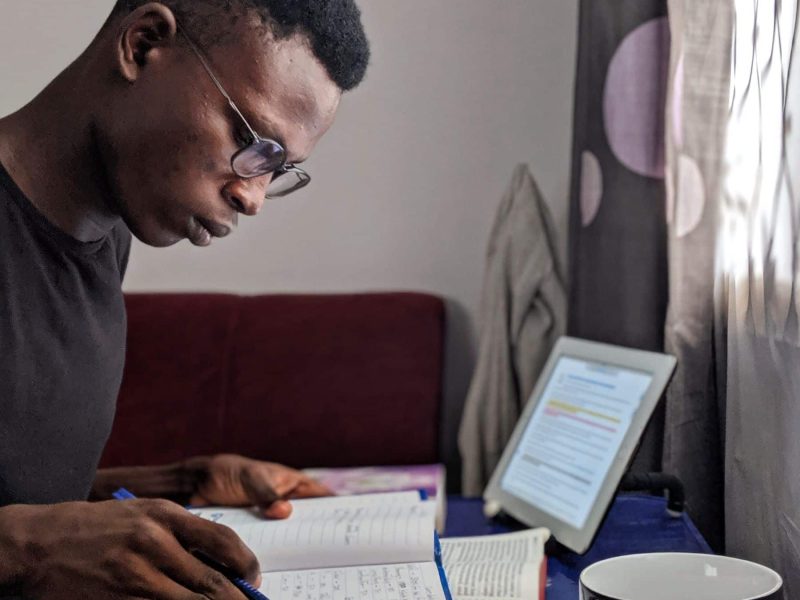The human dilemma
Getting out of bed …Passing up that desert …Responding to a nudge to pray …Turning the other cheek … Letting go a need to prove I am innocent… Stepping through the fear of what others might think…. Turning my mind toward pure thoughts …All of these may be struggles between the desires of the flesh and pleasing God. How may I dwell in a place with God where such tendencies don’t rule me?
What makes it possible for a believer to dwell in the presence of God and overcome the drawing of the world and the selfish desires of the flesh (natural man)? How can we enter in … and overcome?
God’s answer in the pattern of the Tabernacle
- Hebrews 9:1-10
- Visualized by transparency
- Gifts and sacrifices not adequate
- Outward regulations a temporary way to deal with the problem
The veil separated sinful worshippers from the presence of a Holy God
- Love of sin in a person, keeps one from the presence of God
- Thought (remembrance) of sin in God’s mind, keeps people from His Holiness
- Law; basis of service, keeps one outside the veil
- Veil is a symbol of separation between a sinful man and holy God
- Holiest Place was still closed (Hebrews 9:8)
The veil is torn in two
- Christ suffers on the cross and at His death the veil is rent
- Matthew 27:45-53; Mark 15:33-38; Luke 23:44-47; John 19:28-30
- Darkness, separation
- Cry with loud voice, yielded up His spirit, breathed His last, committed His spirit to Father
- Veil in temple was torn in two, top to bottom (four inches thick)
- Tombs opened, bodies raised, believers resurrected, entered holy city
- Centurion recognizes Christ as the Son of God, as innocent
Christ entered into the Holiest of Holies
- He is the door, the way, the path into the Holy of Holies, the presence of God (Colossians 1:18-22)
- With His blood as a sacrifice and to cleanse the way for us (Heb 10:19)
- He went through the veil, that is, His flesh (Heb 10:20)
- His blood cleanses our conscience from dead works to serve the living God (Hebrews 9:11-14)
Blood of Christ represents His life given sacrificially for us
- Life of flesh is in the blood (Leviticus 17: 11)
- What kind of life did Christ have (and give) as an atonement?
- His life was one of perfect obedience through dwelling in the Presence of His Father while in His body dealing with natural aspects of living
- His life was the Word made flesh, the life of the Eternal Spirit (9:14)
- His life was the disposition to Self-offering, Self-sacrifice
Christ demonstrated this kind of life in His body
- He saw His body as a gift (stewardship) from God (Hebrews 10:5-10)
- He went beyond the sacrificial system of substitute animals (law) (Proverbs 21:3)
- His purpose and attitude was to do the will of God (John 4:34)
- By this will, we have been sanctified through the offering of the body of Christ (flesh) once for all
Veil of the flesh, the life of a carnal Christian, prevents a person from entering into what Christ has prepared for us, but …
- Power of Holy Spirit makes it possible to enter in (Romans 8:8-13)
- To die with Him as He did and to live with Him as He lived enables us to go through the veil of flesh and dwell in the living reality of nearness to God
- We can present our body as a living sacrifice daily (Romans 12:1-2)
- We overcome natural desires and cravings by consecration to Him
- We can cease to try to be good on our own effort, or religious regulations, by resting (trusting and obeying) in His finished work (John 19:30; Hebrews 4:10-11; Colossians 2:20-23)
- We can be reconciled to God and to others just like Jews and Gentiles because the middle wall of partition, the veil, [the fleshly things that separate us from one another] has been removed (Ephesians 2:11-16)
We live beyond the veil, dwelling in the Presence of God, by
- A sincere heart to worship and serve God there (Heb 10: 19-25)
- Confessing our hope in His life coming from there
- Activating the power of the Holy Spirit in our will through worship, prayer, dependency upon Him
- Considering our body as a stewardship from God in which we choose to do the will of God because His choice to do the will of Father dwells within us
- Stimulate one another to love and good deeds because of His life in us
- Assemble ourselves together as He is fitting us in relationships with others in His Body (Colossians 2:19)
- Encouraging one another
Let us draw near, enter in, beyond the veil (of flesh and religion) to the grace, life, and relationship He has provided for us.








